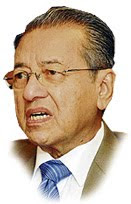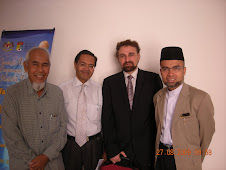2008/09/18
Poor Muslims slipping through the zakat net
By : Siti Nurbaiyah Nadzmi
Email to friend Print article
MALAYSIAN Muslims paid more than half a billion ringgit in zakat last year. Both the number of people paying and the amount collected are steadily growing.
Datuk Wan Mohamed Sheikh Abdul Aziz says Baitulmal is trying to compile a comprehensive database
Abdul Ghani Mohd Yusof hopes the Welfare Department or Baitulmal will cut red tape, especially during Ramadan
That staggering figure should be enough to help the poor, if not eradicate Muslim hardcore poverty. Unfortunately, the harsh truth is that some of these hardcore poor Muslims are not even on the list of zakat beneficiaries.
Rosnaini Abu Hassan, 51, is one of them. She lives in a two-room flat in Taman Sentul Utama, between the prestigious residential condominiums of East and West Sentul.
Unlike her privileged neighbours, Rosnaini is unemployed and homebound, caring for her invalid 88-year-old mother and a disabled 18-year-old son.
Her eldest son does his best with his RM850 salary to foot their bills: the flat's RM450 rental, utilities, food and medical expenses.
For Hari Raya, neighbours and the surau at the flat help out with donations in cash and kind, but Rosnaini has never received anything from Baitulmal, the body responsible for distributing zakat funds collected by state religious councils.
Federal Territory Baitulmal deputy chairman Datuk Wan Mohamed Sheikh Abdul Aziz admits that their biggest challenge lies in compiling data on zakat beneficiaries.
"We work with the Welfare Department to identify and locate the poor but we are aware that this is not enough," he says.
The database leaves out at least 30 hardcore poor families in Taman Sentul Utama alone.
Wan Mohamed says Baitulmal is trying to compile a comprehensive database by networking between its amil (officers appointed to collect zakat) and non-governmental organisations (NGOs) to identify the poor and hardcore poor.
Some may say it's Rosnaini's fault that she is not registered with the Welfare Department or Baitulmal. But to register, she would need to fill out forms and hand in photocopies of supporting documents -- including a police report, letter of declaration and a passport photograph.
"I can't read. I can't write. I can't leave the house," she says in embarrassment, admitting that she is the third generation of Kampung Puah Seberang squatters, who inherited her parents' and grandparents' urban poverty.
That vicious cycle could have been broken by zakat, says a senior economist with a leading Islamic financial institution.
"It is achievable by making Baitulmal completely independent and taking it out of the governance of the respective state religious councils."
At present, each state religious council manages its own Baitulmal and this creates tremendous legal barriers against disbursing zakat funds from one state to another.
Minister in the Prime Minister's Department Datuk Seri Dr Ahmad Zahid Hamidi recently suggested that the collection of zakat be streamlined without crossing the boundaries of state authorities.
Wan Mohamed agrees that this would help Baitulmal to improve zakat distribution while paving the way for Baitulmal from other states to share their zakat funds with states that collect less.
"Central collection would be ideal," says Wan Mohamed, "but we wouldn't want to be seen as taking over the state's jurisdiction over zakat."
So how could it be done?
If Baitulmal were centralised, independent and established under the Council of Rulers, suggests the economist, the rulers -- who are the heads of Islam for their respective states -- would be able to decide the amount of disbursement for their states. This would reduce the chances of misuse of funds and abuse of power, he suggests.
The economist also criticises some Baitulmal for investing in stock markets and acquiring property.
"Putting zakat funds into business, risks it on market trends, which is morally wrong and could be haram (not permissible) if the funds are used to generate income while there are still hardcore poor people in the community," he says.
"Zakat should be disbursed and not carried forward into the following year as a surplus, let alone played on the stock markets or used to acquire commercial properties."
The definition of poor and hardcore poor also works against many families, claims the economist. The RM430 monthly income cut-off point between a poor and hardcore poor household, as listed by the Economic Planning Unit in the Prime Minister's Department, is unrealistically low, he says. According to this definition, only 3.6 per cent of households are considered hardcore poor.
The huge improvement in poverty indicators, he claims, is partly due to a poverty definition that is too low; far below the minimum monthly income required by a household of five to meet basic needs such as food, clothing, rental, utilities, healthcare and education.
For example, based on 2007 methodology, a household in Peninsular Malaysia is considered poor only if its monthly income is less than RM720. This denies many poor families financial aid and other welfare assistance, including zakat, he says.
At Taman Sentul Utama, the welfare of these hardcore poor families is handled by the flats' surau committee, which compiles a list of the poor in the neighbourhood. None of the hardcore poor on their list receives any aid from either the Welfare Department or Baitulmal.
Taxi driver Abdul Ghani Mohamed Yusof, one of the surau committee members, says the surau keeps its list updated so that whenever NGOs or well-wishers offer their contributions, it is easy for the committee to distribute the alms to the poor.
Ghani hopes the Welfare Department or Baitulmal will survey these poor families, putting aside protocol and red tape, especially during the holy month of Ramadan. The surau has asked the Welfare Department about assistance for the poor, he says.
"But we were told that for the poor to get welfare benefits, they have to apply to the department or Baitulmal themselves."
Subscribe to:
Post Comments (Atom)







































No comments:
Post a Comment